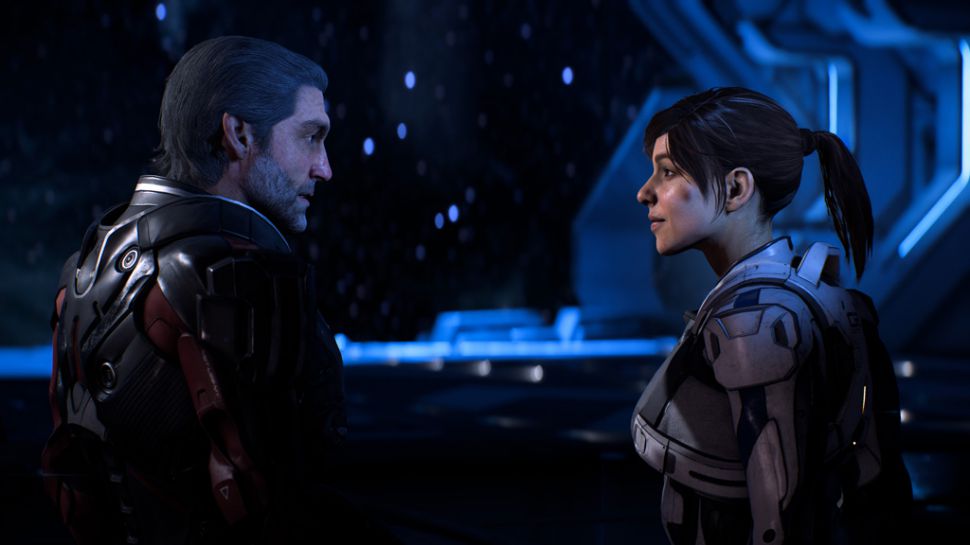Mass Effect: Andromeda has come in for its fair share of criticism, with its awkward dialogue singled out as a particular weakness. But it’s not just the writing that’s bad – the underlying dialogue system itself is worse than it was in the original trilogy. In fact, in this regard the series has been all downhill since the first game’s release in 2007.
The original Mass Effect’s Renegade and Paragon system was far from perfect, but it gave the player a very real sense of choice. You’d pick from a range of responses during conversations and, occasionally, you’d have the option to ‘Charm’ or ‘Intimidate’ the person you were talking to. Usually this was in order to solve a sticky situation, or shortcut an objective.
Although these choices were admittedly too binary – most broke down to Shepard either being a goody two-shoes or a massive dick – they were always interesting. Shepard would end up waving their gun around, whacking somebody in the face or, on the flip side, flirt their way into a few extra credits. These moments were examples of the series at its over-the-top best.

Dramatic impact
One of the criticisms leveled at the system was that these dialogue choices always led to the most advantageous outcomes – they were ‘auto-wins’. But that never bothered us.
To access these conversation options you had to invest character points in the Charm or Intimidate options when you leveled up. This meant that to get the most interesting and most successful dialogue options, you had to sacrifice spending points on other skills such as new powers and better weapon capability. If you wanted to ‘win’ at the dialogue, you had less chance of doing so on the battlefield.
It’s a classic RPG move, and added another layer of choice to a game already steeped in meaningful ways to change your Shepard's personal story.
Second chances
Mass Effect 2 changed all that. While we welcomed the addition of interrupts – the ability to perform a Renegade or Paragon option mid-conversation – the core dialogue system took a turn for the worse. Charm and Intimidate remained but your access to these options no longer relied on spending points as you leveled up.
Instead, you had to accrue Renegade (for Intimidate) or Paragon (for Charm) points through choosing certain options in conversations with NPCs. It was a fairly complex system under the hood, but basically meant that in order to unlock Charm and Intimidate options – again, often the most entertaining pieces of dialogue – you had to plan ahead: be nice all the time and you’d be able to charm folk, be ruthless and you’d be able to intimidate them.

While that makes sense from a role-playing perspective and gave Shepard a presence and reputation in the world, it was a far less transparent system that confused a lot of players. Forums were littered with threads of people asking how it worked and complaining that, despite their best efforts, they were locked out of particular dialogue choices.
But worse, it meant that players no longer played the game naturally. It forced you to choose the Paragon or Renegade option in conversations every time to maximize your chances of unlocking a Charm or Intimidate option down the road. There was no incentive to think about what your character was saying in the moment as you always had the end goal in site.

Third time lucky
The third Mass Effect game realized the misgivings of this system. Well, up to a point. It did away with the split between Renegade and Paragon and unlocking Charm and Intimidate options simply relied on your overall reputation, which you built up as you made decisions in the game.
However, by doing this BioWare stripped the second game’s system of its only strength: its role-playing potential.
In Mass Effect 3, if your reputation was high enough, Shepard could swing wildly between sociopath and saint. It made no sense that, having charmed your way through the game, someone would suddenly be intimidated by anything you said. Though it made the system more accessible, it cheapened it and made it feel less individual, less tailored to the Shepard that you wanted to craft.
Andromeda's initiative
Before Mass Effect: Andromeda came out we thought it was dead set to reverse the trend.
Creative director Mac Walters said all the right things to Official Xbox Magazine last month, promising a more nuanced system that incorporated a wider range of dialogue options and more shades of grey, countering a long-standing criticism of the series. “[It] changes by the circumstance and it changes by the character you’re talking to, so you have to actually be more engaged in what’s going on,” he said.
What that led to is a system where dialogue options were assigned to four “tones”: emotional, logical, casual, or professional. In any one conversation all of these tones might be available to you, or, more likely, you’ll be picking between two.

However, players are now finding that the problem with just varying the tones of Ryder’s speech is that there’s very little distinction between any of the options you pick. Sure, you can make Ryder sound a bit pissed off, or pensive, but that’s about it. While it might perhaps be more artistic and less exaggerated, it’s lost the sense of surprise and drama that was in the previous games.
What made the Charm and Intimidate options so special was that they were spectacular and memorable. Mass Effect: Andromeda has little of that; when its dialogue is not jarring, it’s bland. In trying to make the dialogue more nuanced, they’ve taken all the fun out of it.
Ryder is not the blank slate that Commander Shepard was when they first boarded the Normandy and that’s a real shame. Andromeda’s dialogue system is wholly underwhelming and a sign of how much the series has moved away from its role-playing roots.

